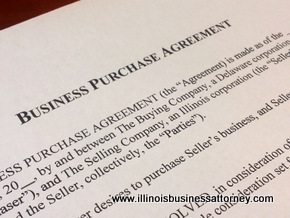Business Acquisition Agreement
 After the parties to the purchase and sale of the business have agreed to the basic terms, usually by means of a letter of intent or term sheet, and the buyer has conducted at least some preliminary due diligence investigation, the next critical step is to negotiate the business acquisition agreement.
After the parties to the purchase and sale of the business have agreed to the basic terms, usually by means of a letter of intent or term sheet, and the buyer has conducted at least some preliminary due diligence investigation, the next critical step is to negotiate the business acquisition agreement.
Purchase of entity or assets?
The first decision that a buyer and seller must make in structuring the business acquisition agreement is what type of transaction the acquisition will be. There are two basic forms of purchase transactions with substantially different consequences: an entity acquisition or a purchase of assets.
Entity purchase. A buyer may purchase all or a portion of the stock (or membership interest in the case of an LLC) of the business entity. In most cases, the purchase would be at least for a controlling (majority) interest. In an entity purchase, the post-acquisition business continues to own all the same assets and be subject to all the same liabilities that existed prior to the acquisition. A sale of stock often provides a tax benefit to the seller, particularly where the business has been operated as a corporation. While buyers typically prefer to purchase the assets of the business, both for tax reasons and to isolate liabilities of the business that predate the acquisition, in some cases the difficulty in transferring ownership of certain of the business' assets will dictate an entity purchase.
Asset purchase. In an asset purchase, the buyer purchases some or all of the businesses assets and may assume responsibility for specific liabilities of the business. The asset purchase agreement will identify the business' tangible property being acquired (such as inventory, equipment, real estate, etc.) as well as the intangible assets (contracts, leases, licenses, trademarks, etc.). The asset purchase agreement will also identify any liabilities that the buyer agrees to assume. After the closing of the sale of assets, the entity itself remains in the hands of its prior owners. In addition to the proceeds of the sale of the assets, the entity may have retained assets (such as bank accounts and accounts receivable) and continues to be responsible for any liabilities not expressly assumed by the buyer.
Which to choose?
Three main factors determine which form is better for any particular business acquisition agreement: taxes, liabilities, and the nature of the assets being transferred.
Taxes. A seller will usually prefer an entity purchase because the seller will pay taxes only at the lower long-term capital gains rates. If the business entity has been operated as a C corporation, an asset sale will potentially subject the proceeds of the sale to double taxation, once at the corporate level and then again when the proceeds are distributed to the shareholders. A buyer, on the other hand, will typically prefer an asset purchase. In an asset purchase, the entire purchase price is allocated among the assets (including goodwill) and can be deducted through depreciation or amortization over the life of the assets. In an entity purchase, the entity continues to depreciate its existing assets the same as prior to the acquisition. The buyer receives no benefit from the value it pays for the assets in excess of their depreciated cost or for any goodwill paid in the transaction.
Liabilities. A buyer will typically favor an asset purchase because the buyer generally will not be responsible for existing obligations of the business prior to the sale, except for those liabilities that the buyer expressly assumes. Even in an asset purchase, a buyer may responsible for certain liabilities of the previous business, but those circumstances are much fewer that if the buyer had taken over the entity. In an entity purchase, the entity itself remains responsible for all of its liabilities. Frequently, the shareholders or LLC members selling their interests in connection with an entity sale will be required to indemnify the buyer from certain liabilities and will often be required to leave a portion of the proceeds in an escrow account to cover their indemnity obligations.
Assets. In some cases, the nature of the assets may favor an entity transfer rather than a sale of assets. For example, the business may have important contracts with customers that prohibit assignment. Even if a contract simply requires notice and consent of the other party, in some cases the buyer may not want to draw attention to the change in ownership. Another situation is where the selling business is in an industry where it must have a governmental license or permit. In some cases, the lengthy process for the new entity to receive its own license or permit may cause the buyer to choose an entity purchase.
Getting professional advice
Choosing between an entity purchase or an asset purchase is often not cut-and-dried. The decision often requires the buyer and the seller to weigh the benefits and drawbacks of each. Where the seller reaches one conclusion and the buyer determines that the opposite is best, trade-offs are often necessary to reach an agreement. An experienced business attorney can help you balance the tax and legal issues as they apply to you and work with you to negotiate the best terms for your business aquisition agreement.